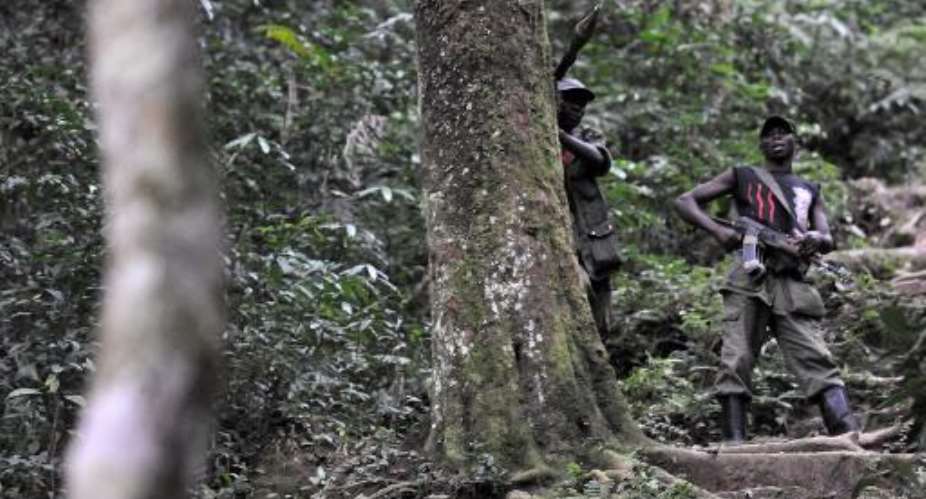Bukavu (DR Congo) (AFP) - A Congolese army offensive against Rwandan Hutu rebels may be advancing rapidly, but many fear it is failing in its main objective of disarming them as the fighters melt away into the forest.
The violent resistance initially put up by the Democratic Forces for the Liberation of Rwanda (FDLR) in its strongholds in the eastern Democratic Republic of Congo has given way to retreat, with the guerillas avoiding clashes with the army.
"It is a war without battles," a source involved in the operation told AFP, saying FDLR militants seemed to have only fought when the operation began in late February to buy time for their families to flee.
The tactical retreat is confounding the army's goal of disarming the fighters who have been blamed for killings, rapes, looting and the forcible enlistment of children in the two decades since they were chased out of neighbouring Rwanda following the 1994 genocide.
"The FDLR is taking off, fleeing into the forest," a school teacher in eastern DR Congo, who identified himself as Patrick, told AFP.
That lack of resistance as troops advance is not itself a problem, officials in the operation note -- though the rebel vanishing act does thwart the strategic objective of rendering them harmless.
- 160 'neutralised' -
"The main mission of the armed forces is not to kill FDLR members, but rather to oblige them to disarm," says Major Simon Tuajiki Mameja, spokesman for the military operation in South Kivu province. "In our view, this isn't about engaging in combat with them."
Army officials say around 160 rebels had been "neutralised" by mid-March, though they would not specify how many among those had been killed, captured or surrendered.
That number is still relatively small against estimates of FDLR fighters numbering between 1,500 and 2,000 -- roughly one quarter of the size of the force six years ago.
Many fear the rebels will try to simply wait out the operation, and return once the pressure has abated.
Older FDLR members are thought to have taken part in the 1994 genocide in Rwanda, when at least 800,000 people, mainly from the Tutsi minority, were massacred.
And while only 200 to 300 of those senior fighters are still believed to be alive, the rebel group has been repeatedly blamed for serious human rights violations in eastern DR Congo.
The international community has insisted Kinshasa must defeat the FDLR as a first step in quashing numerous militias that have been causing violent chaos in the east of the vast central African country for three decades.
The current operation was supposed to have received strategic, logistical and operational support from the UN mission MONUSCO, which has a special mandate to take the offensive against armed groups.
However, MONUSCO withdrew its offer when Kinshasa refused to remove two generals leading the campaign who have been accused of abuses by the UN.
And on the ground in South Kivu, locals insist that many of the Rwandan rebels had settled down as farmers and "weren't bothering anyone".
An elder in Sange, two hours south of the provincial capital Bukavu, said that the offensive was only likely to push the rebels onto other communities further to the north and west.
As with other campaigns against the rebels in the past, "it risks just moving the problem on", a diplomat warned.





 April 20: Cedi sells at GHS13.63 to $1, GHS13.06 on BoG interbank
April 20: Cedi sells at GHS13.63 to $1, GHS13.06 on BoG interbank
 Dumsor: I'm very disappointed in you for messing up the energy sector — Kofi Asa...
Dumsor: I'm very disappointed in you for messing up the energy sector — Kofi Asa...
 Dumsor: Instruct ECG MD to issue timetable and fire him for lying — Kofi Asare t...
Dumsor: Instruct ECG MD to issue timetable and fire him for lying — Kofi Asare t...
 Ashanti region: Road Minister cuts sod for 24km Pakyi No.2 to Antoakrom road con...
Ashanti region: Road Minister cuts sod for 24km Pakyi No.2 to Antoakrom road con...
 Train crash: ‘How could any normal person leave a car on rail tracks?’ — Frankli...
Train crash: ‘How could any normal person leave a car on rail tracks?’ — Frankli...
 Train crash: Driver of abandoned vehicle not our branch chairman nor secretary —...
Train crash: Driver of abandoned vehicle not our branch chairman nor secretary —...
 Kenya pays military homage to army chief killed in copter crash
Kenya pays military homage to army chief killed in copter crash
 US agrees to pull troops from key drone host Niger: officials
US agrees to pull troops from key drone host Niger: officials
 Mahama vows to scrap teacher licensure exams, review Free SHS policy
Mahama vows to scrap teacher licensure exams, review Free SHS policy
 Government will replace burnt Madina shops with a new three-story, 120-store fac...
Government will replace burnt Madina shops with a new three-story, 120-store fac...
